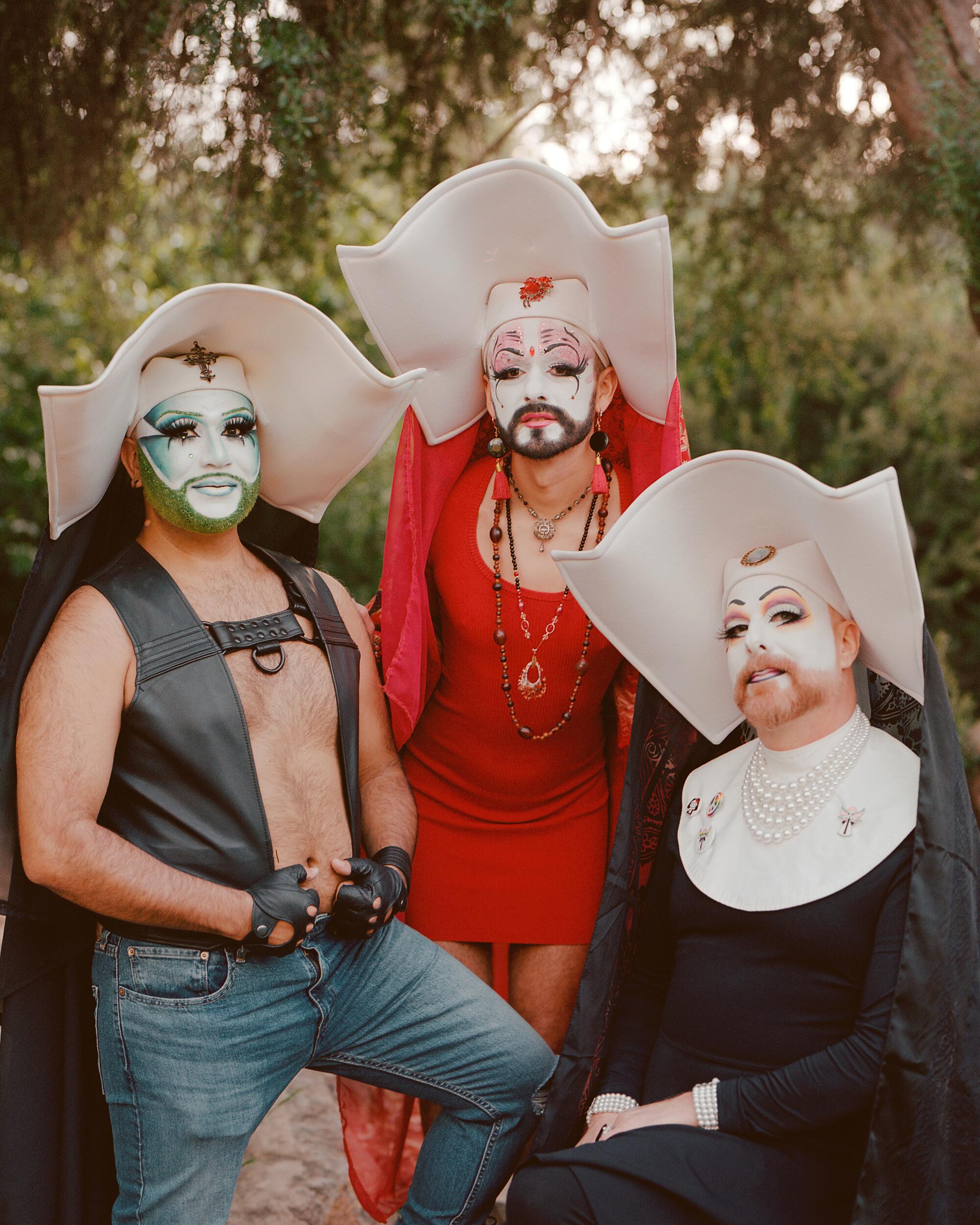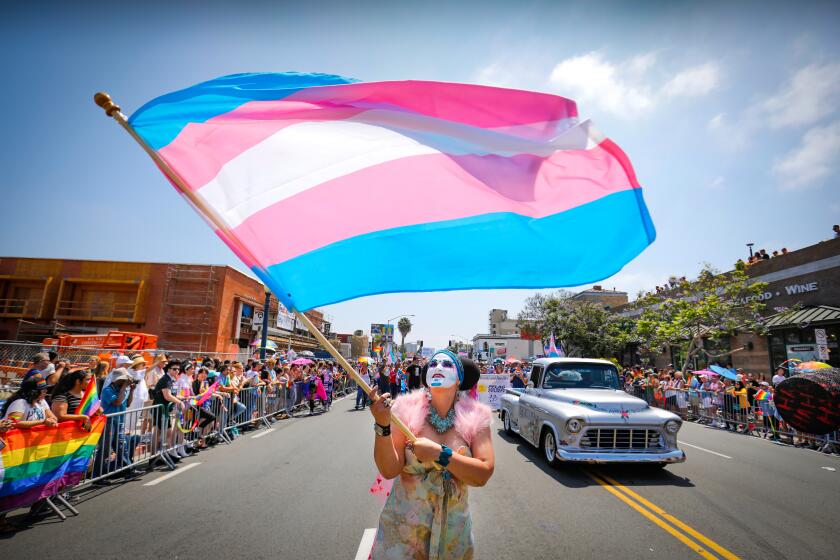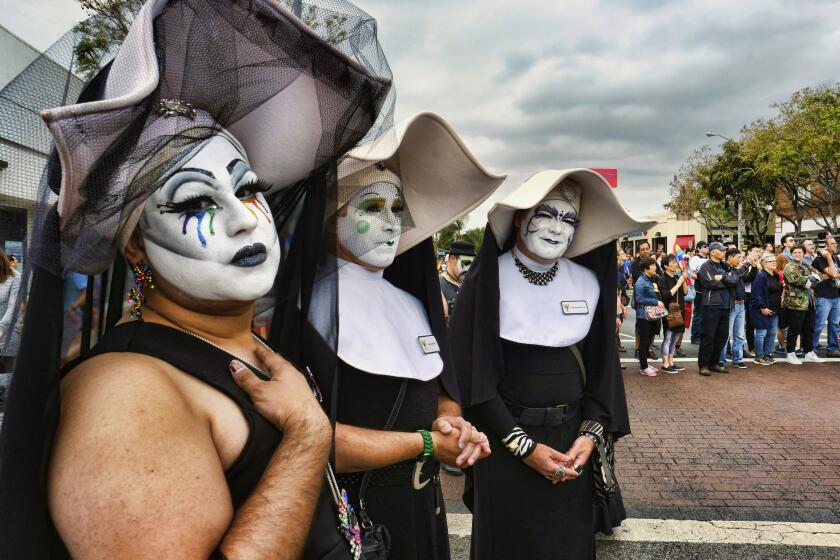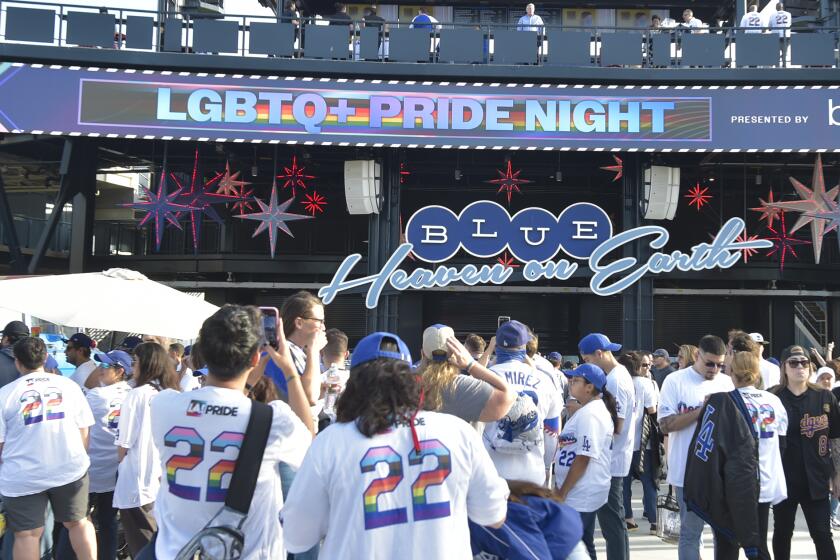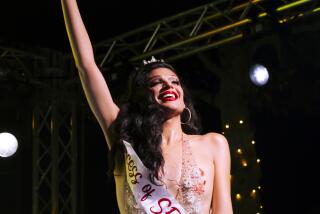- Share via
Ask the L.A. Sisters of Perpetual Indulgence why they decided to join the order of drag nuns, and most of them will tell you it’s because they felt the call.
Sister Tootie Toot (glitter green lips, dark beard, emerald cocktail dress) felt it like a ton of bricks when she walked into a leather bar where several sisters had assembled.
Sister Unity (tangerine veil, tangerine eye makeup, furry tangerine stole) felt it like a tingling mix of fire, ice and electricity when she happened upon the original order of sisters blessing the crowd at a pride parade in San Francisco.
And Sister Candy Cide of the Immaculate Misconception (long-sleeve black dress, white bib, several strands of fake pearls) was struck by the feeling of power emanating from a group of visiting drag nuns walking down the street at an L.A. Pride event.
“I was still feeling the guilt that I was going to let my parents down because of who I was,” she said. “When I found out the message of the sisters was about removing stigmatic guilt and repairing people’s joy, I was like, ‘I need to do that for myself, and I need to do it for other people too.’”
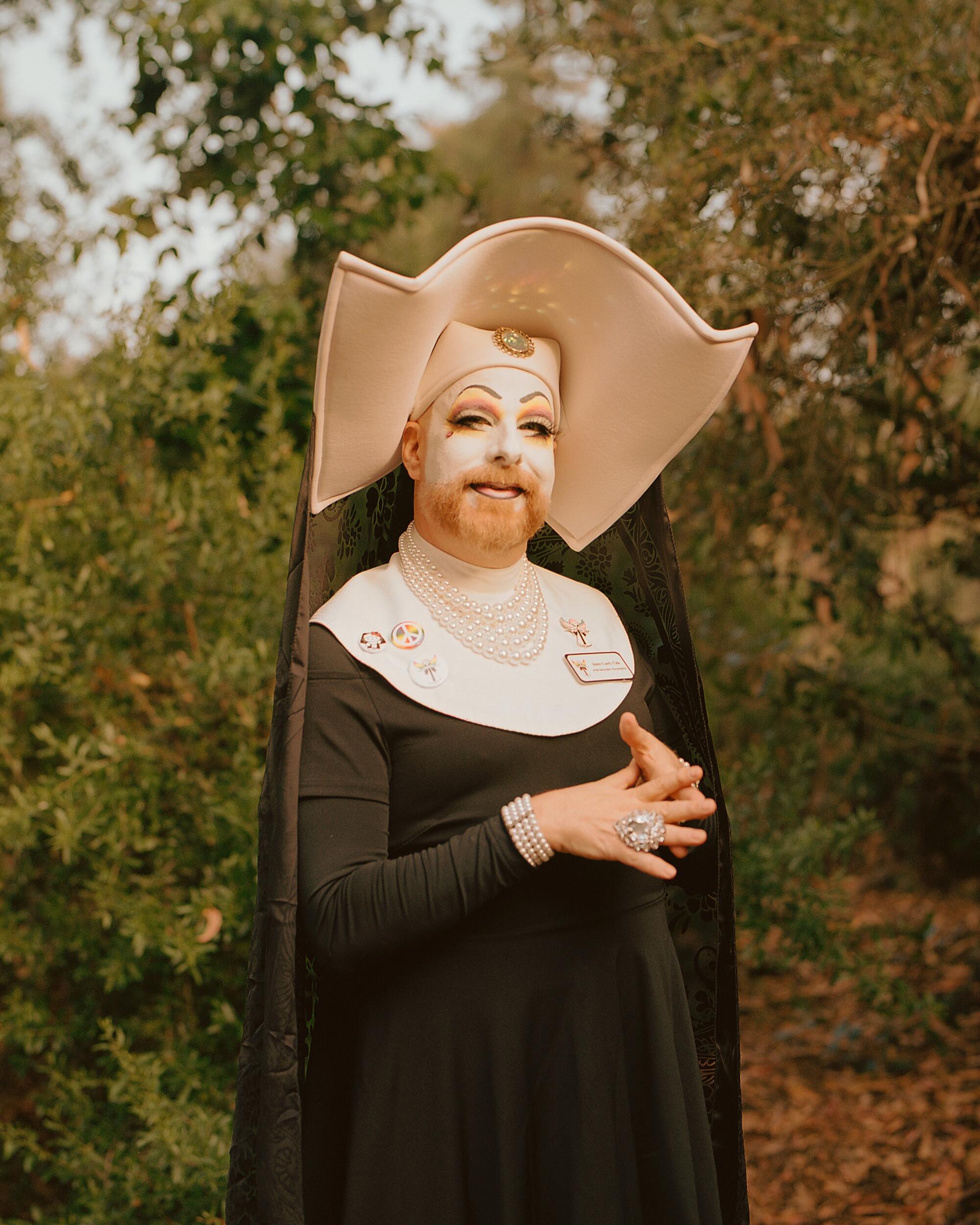
With their signature white makeup, oversize wimples (they call them Hoobie Doobies) and supersize lashes, the Sisters of Perpetual Indulgence turn heads wherever they go. But the group’s national profile soared to new heights recently when the Dodgers announced that they would recognize the sisters with a community heroes award, rescinded the award after pushback from conservative Catholic groups and then reinstated it — all over the course of a whirlwind few days.
The sisters reaccepted the award as Dodgers leadership vowed to better educate themselves. Instead of bitterness, the sisters offered up a benediction:
May the games be blessed!
May the players be blessed!
May the fans be blessed!
May the beer and hot dogs flow forth in tasty abundance!
While some might have found it difficult to forgive the Dodgers, that’s not the sisters’ way, said Sister June Cleavage, a cisgender female member of the group. (The Sisters of Perpetual Indulgence welcome people of “every gender, race, romantic alignment, class, species, phylum, beverage preference, & sexual proclivity,” according to their website.)
“You don’t come to this organization without understanding, without compassion and without having fought these kinds of battles before on a smaller scale,” she said. “I think it comes with the calling.”
On a recent spring evening, 11 sisters gathered at Elysian Park in the shadow of Dodger Stadium in full regalia to discuss the past, present and future of the nonprofit group in the wake of the recent hullabaloo.
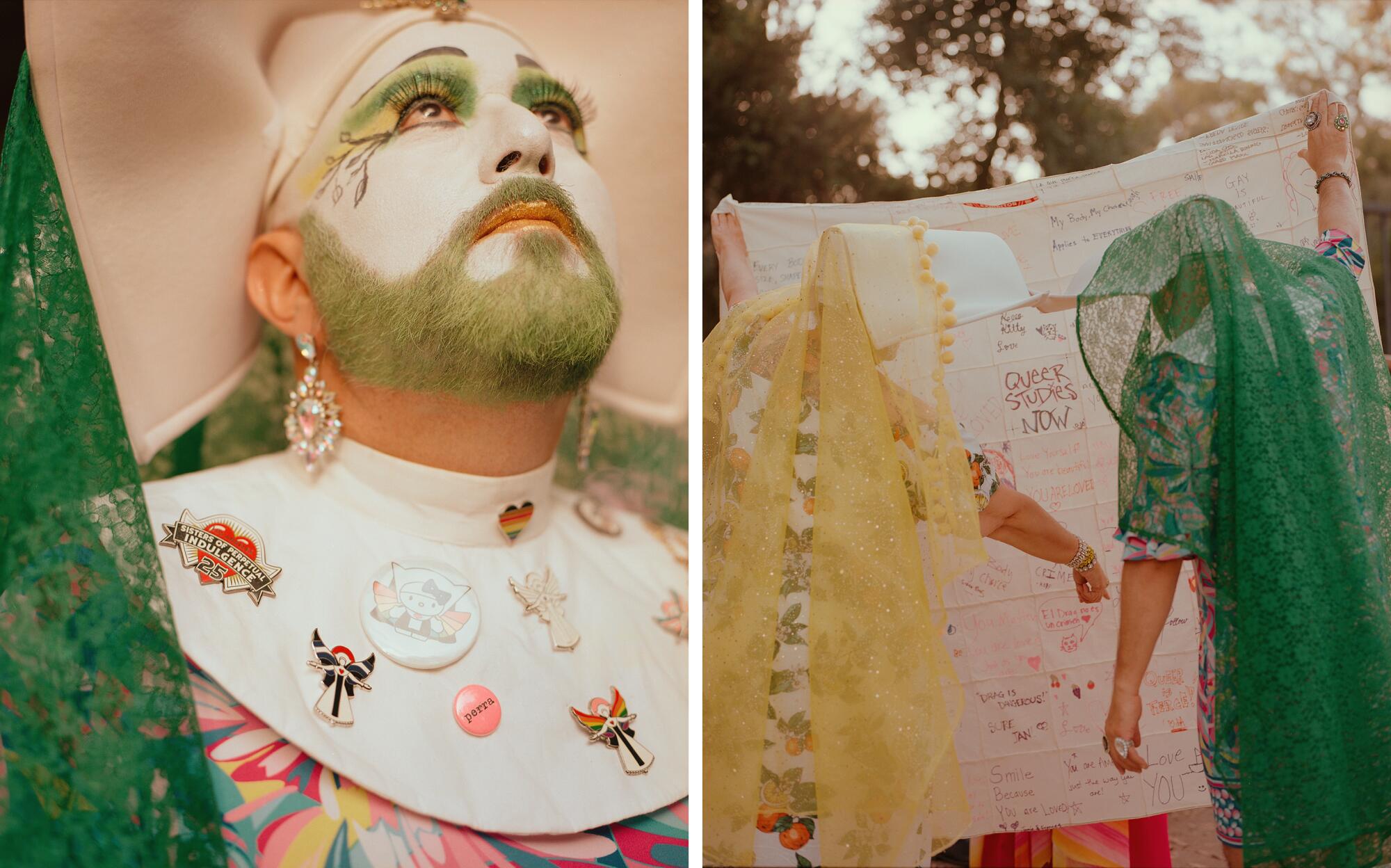
The sisters’ origins date to 1979, when three gay men began running around San Francisco in nun’s habits. What started as an audacious joke quickly became more serious when the AIDS crisis struck in the early ’80s and the Sisters of Perpetual Indulgence held the first fundraisers for AIDS organizations and put out the first safer-sex pamphlet.
Word spread of the group that married irreverence with service, and new chapters sprang up in cities around the world, including in L.A. in 1995.
The sisters’ mission statement is “the expiation of stigmatic guilt and the promulgation of universal joy,” but since their inception, they’ve been called diabolical and anti-Catholic and accused by their detractors of mocking Catholic nuns.
The Dodgers faced backlash after they said they would no longer honor the satirical LGBTQ+ group. But they reversed course and reinvited the Sisters.
That’s not how they see it.
“We’re not mocking anything,” said Sister Harlot D Lite (red ribbed mini-dress, red tassel earrings, ornate pink makeup). “We appreciate nuns, and we’re doing it our own way, for our community.”
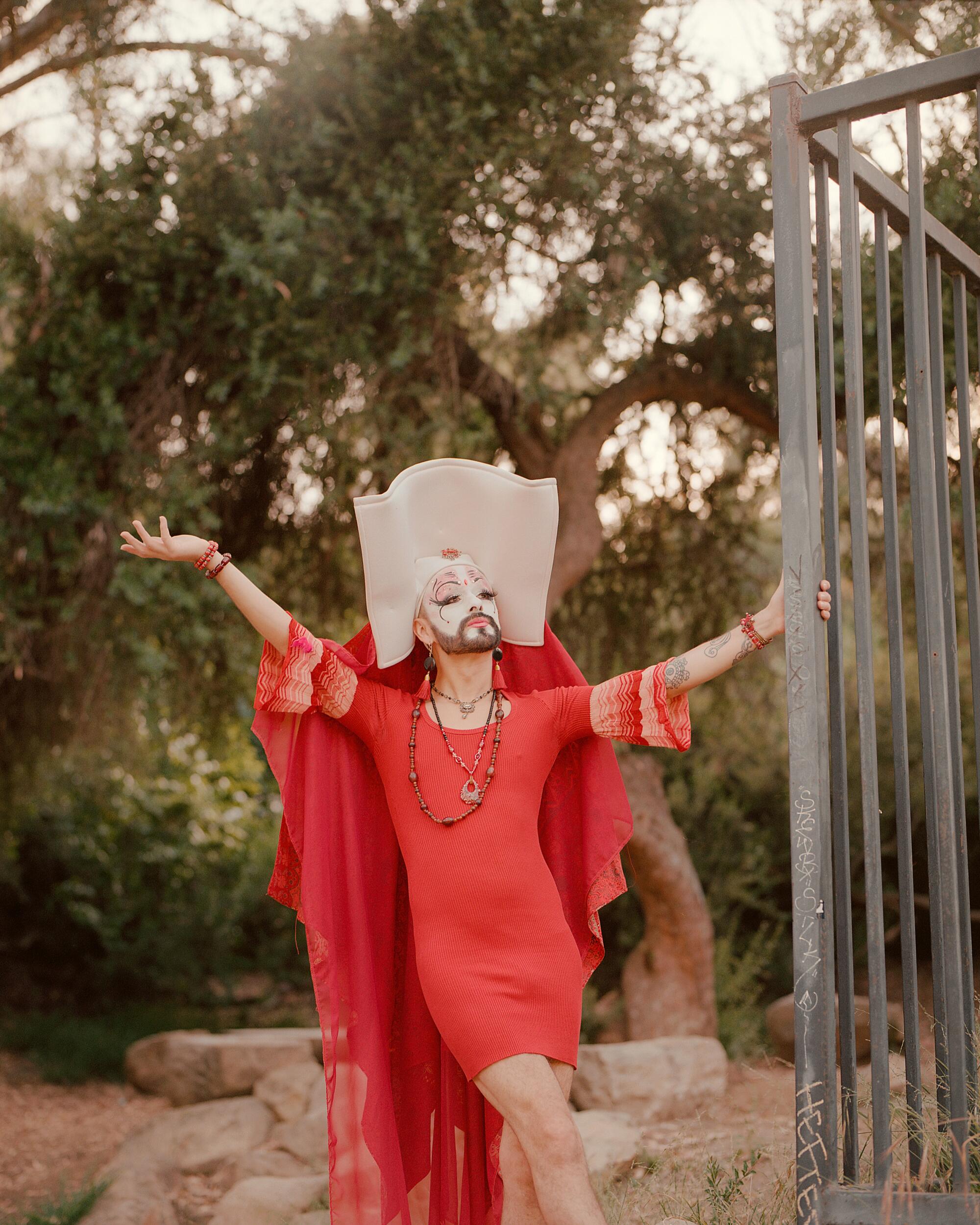
All of the sisters work on a volunteer basis, and any money they earn through donations, appearances or the events they throw is disbursed to charitable organizations.
“Any dollar that comes into the sisters goes right back out to the community,” Sister Candy Side said. “It doesn’t benefit us in any way.”
They also minister individually to people in need.
We do have a serious responsibility. Let’s live up to that and give people the truth of our hearts as well as the glitter and humor.
— Sister Unity
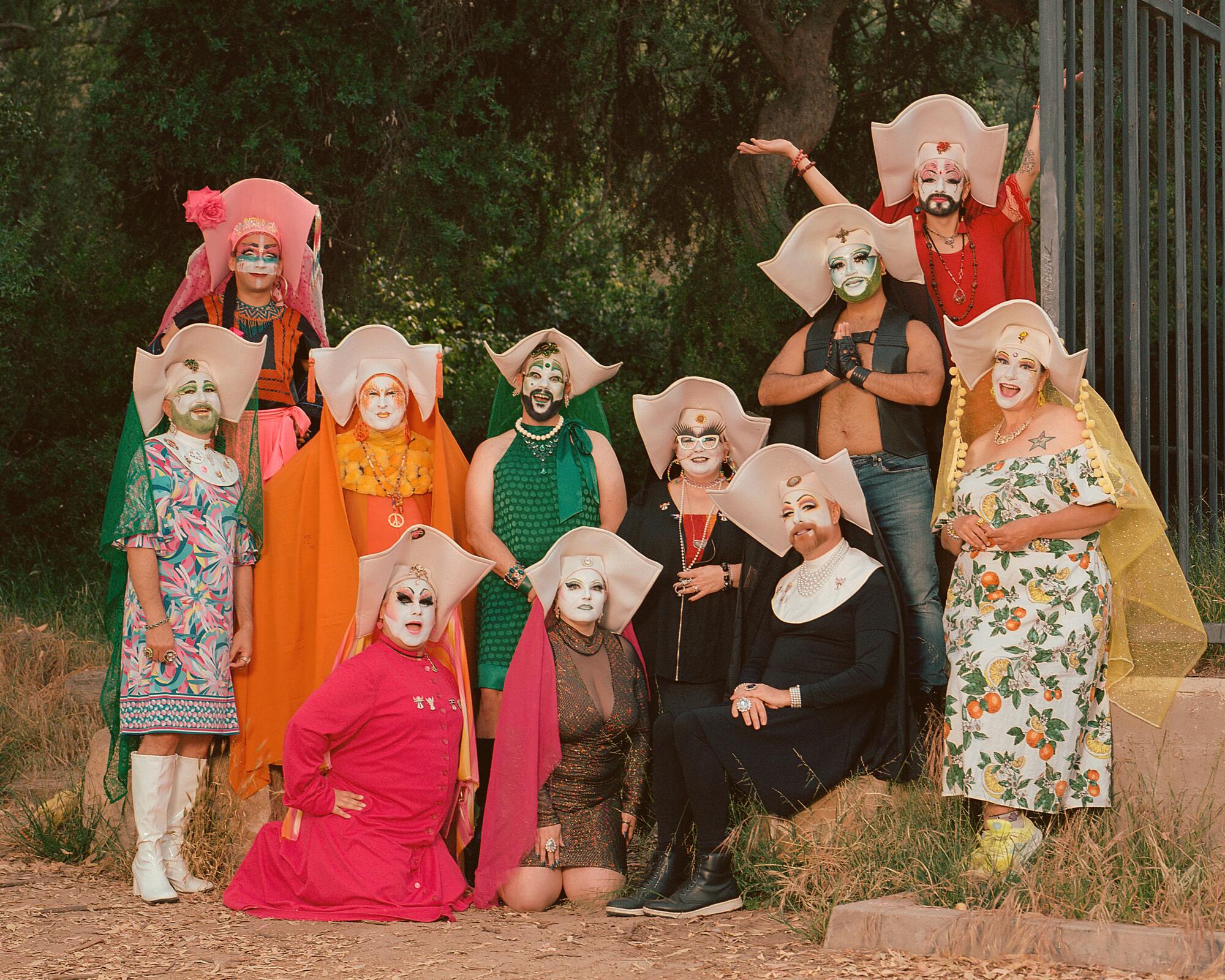
“Early on, it surprised the heck out of us to discover that people like the joke, but they also took the nun aspect seriously,” Sister Unity said. “And we started to think, ‘You know, we do have a serious responsibility. Let’s live up to that and give people the truth of our hearts as well as the glitter and humor.’”
Now, the sisters call one-on-one interactions “mission work” and said they happen all the time. They recalled the time Sister Mariposa Patriota, now a sister emeritus, was standing on a corner in West Hollywood amid the thump-thump of dance music, talking with a young man who had just come out to his parents in Orange County. He was crying because it hadn’t gone well. She assured him that he would be OK and that, while it was painful now, there was a community of thousands ready to support him and be his friends and family.
Sister Unity remembers taking a confession in the bathroom stall of a gay bar from a burly leather daddy who was worried about his boyfriend. Sister June Cleavage recently spent 30 minutes at the sisters’ annual White Dress Party holding the hand of a volunteer who was grieving for his mother, who had recently died.
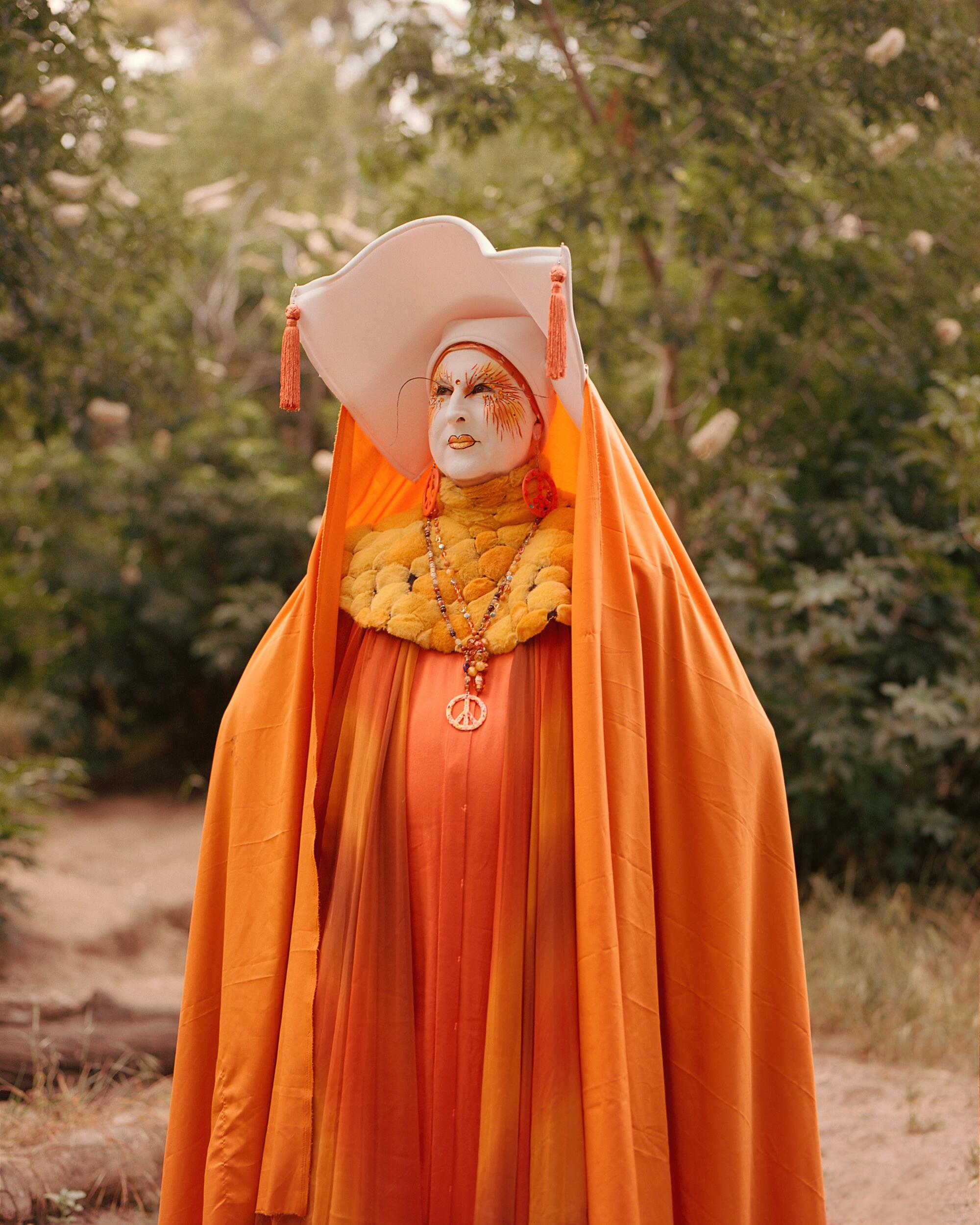
Some sisters think the anonymity of the white makeup allows people to open up to them.
“It’s a mask, and sometimes people are more comfortable talking to a mask than an actual person’s face,” Sister Candy Cide said.
Anaheim’s mayor invited the Sisters of Perpetual Indulgence to the Angels’ Pride Night after the charity organization of satirical drag nuns was initially snubbed by the Dodgers.
Sister Loose Clarita, whose striped iridescent makeup resembles the Mexican flag, said the sisters are playing with the archetype of the jester or the clown.
“Unless you have a phobia, you know the clown is not going to hurt you. He’s the dumb one, the one that has no value,” she said. “And so it allows us to access in other people the dark places they might be afraid to go.”
Joining the Sisters is not as simple as choosing a great name and putting on makeup. The process usually lasts at least 18 months.
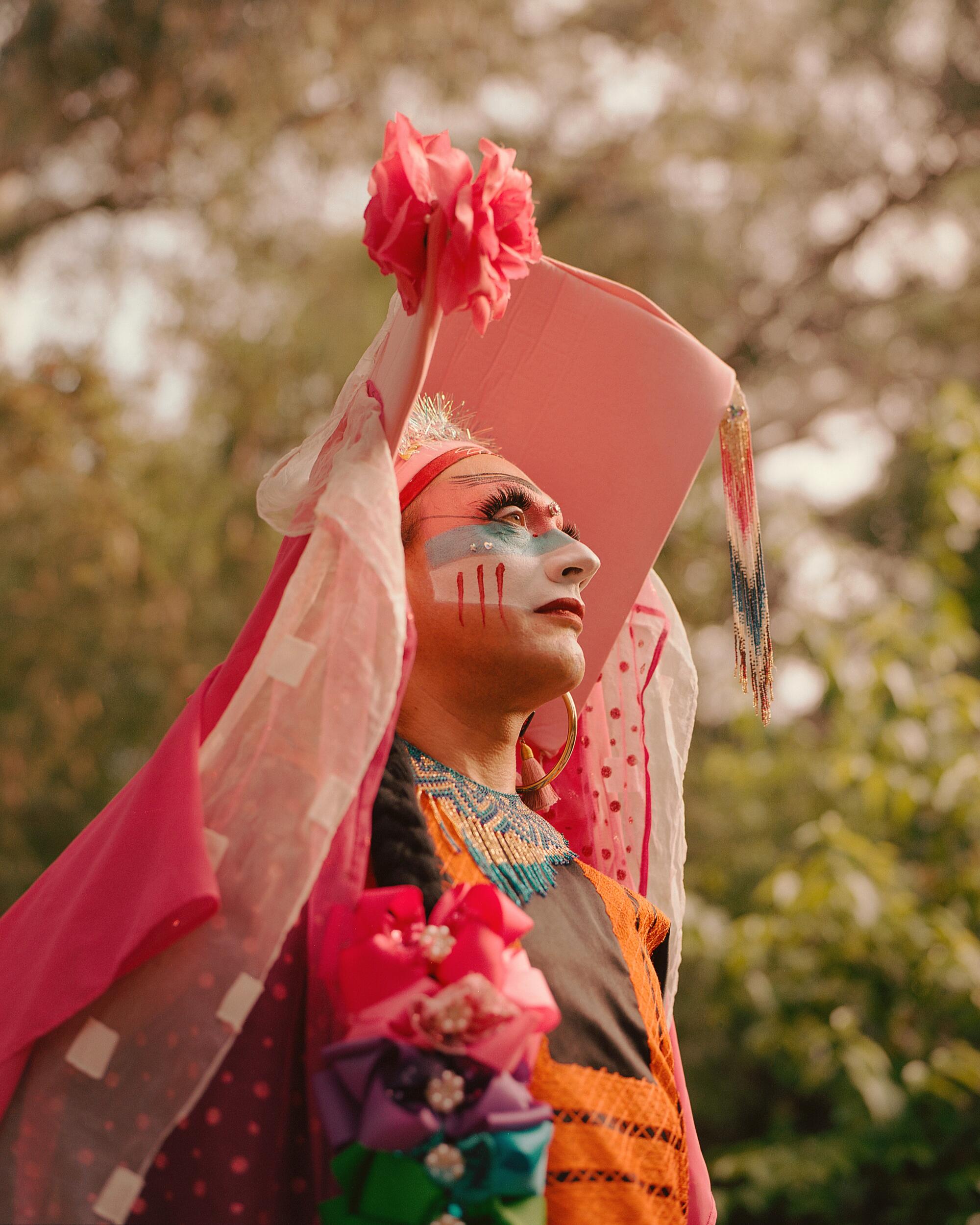
It begins with the aspirant stage, when a person declares their interest in becoming a sister, selects a name and starts attending meetings.
If that all goes well, three months later, she enters the postulant stage, at which she can start wearing the makeup but is not yet given a veil.
Six months after that, she will move up to the novice stage, at which she dons the Hoobie Doobie and is expected to participate in events and meetings but must wear a white veil at events.
To graduate to full-fledged sister, each novice must complete a project, such as producing an event or organizing a safe-sex campaign. One sister wrote a cookbook and gave the proceeds to an AIDS organization. Another organized a sister story time at an LGBTQ+ space in Torrance, where sisters read to kids in English and Spanish.
“What I tell people is that each stage is kind of like, ‘Does your crazy match our crazy?’” Sister Kumonawanna Leya said. “And also, ‘Are you here for the work in addition to the frivolity?’ Because it is work.”
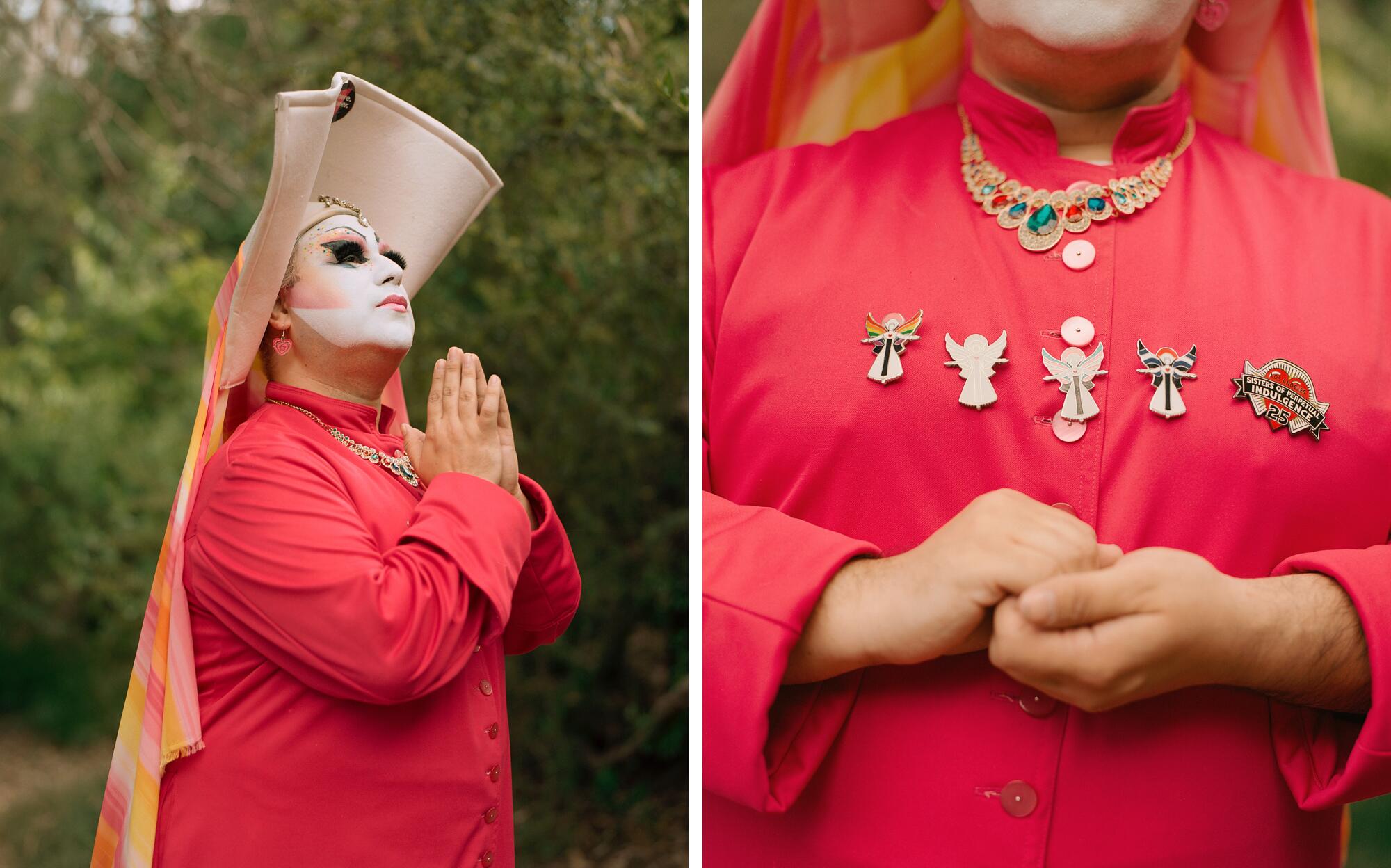
The sisters are used to attracting attention, but many acknowledge that the recent whiplash has taken an emotional toll.
When news media suggested that the Dodgers initially rescinded the award because the baseball team’s fan base is largely Latino and Catholic, Sister Bearonce Knows, a lifelong fan of the team, was upset. “I was like, ‘Yeah, that’s me,’” she said. “So what do you want to talk about?”
Sister Tootie said that for many of the sisters, the initial snub called up painful experiences from the past.
“My initial reaction was here we go again — same old, same old,” she said. “As mostly queer and gay people, we’re used to disappointment and things being taken from us. A lot of us have experienced that with our families and friends and communities.”
But many of the sisters said there was an upside to the experience too, even before the Dodgers apologized.
“I am a Mexican gay man who lives in the United States of America, so I’m always scared,” Sister Bearonce said. “This particular situation doesn’t change that for me, but I felt mostly supported, not only by our own community but from people outside our community as well.”
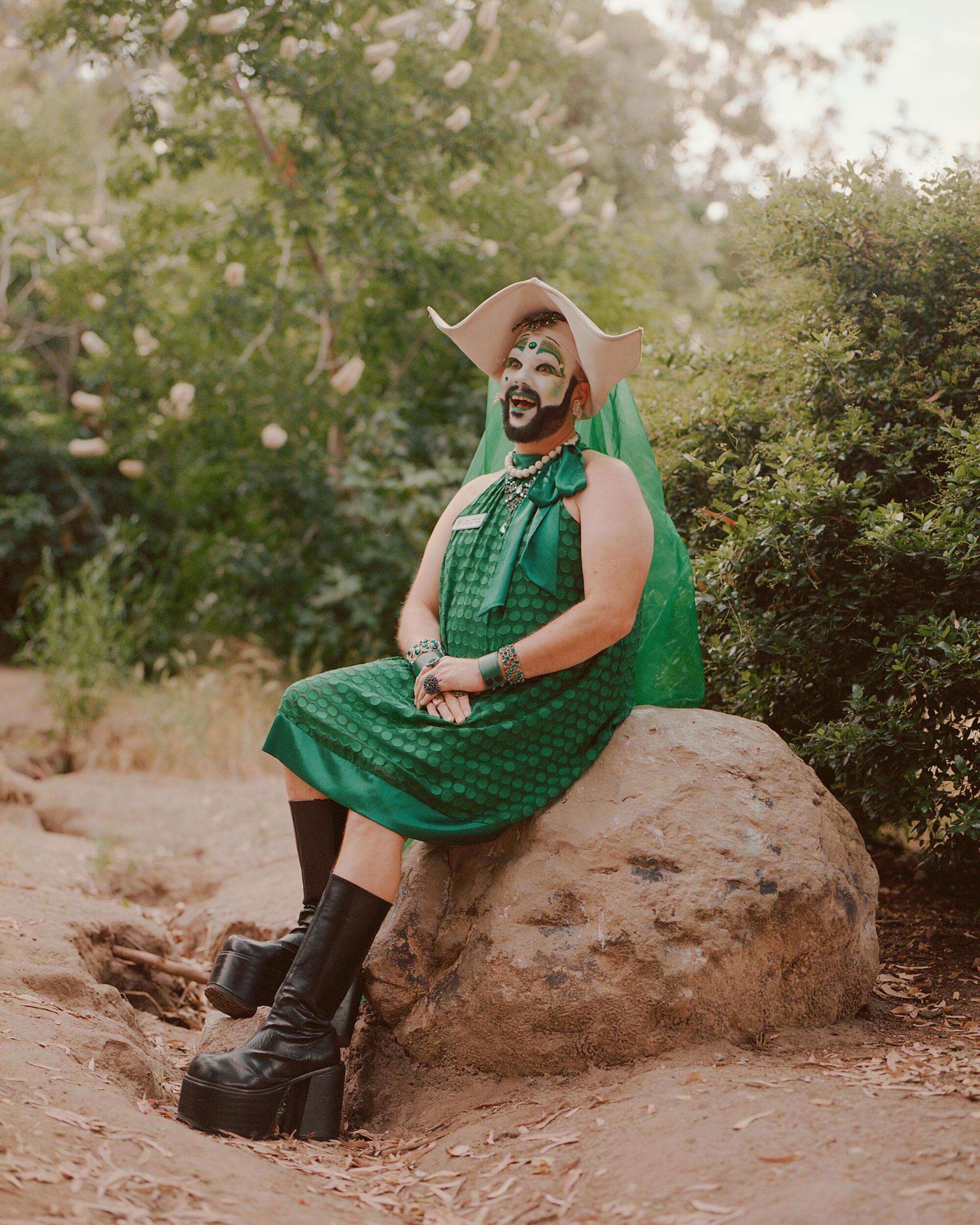
Sister Tootie agreed. “I was initially sad, but when I saw the outpouring of love that came out, it just brought me back to life,” she said.
Sister Unity was touched by all the support that came from LGBTQ+ organizations, which haven’t always been universally welcoming to those who do drag.
“I think it’s a cultural change in the LGBTQ community,” she said.
But for Sister Candy Cide, the most meaningful support she received came from her biological family.
By removing the Sisters of Perpetual Indulgence from their Pride Night, the Dodgers’ effort to profit off their legacy of inclusion has backfired.
Years ago, she struggled to come out to her parents.
Over the last week, though, her mother called to share that she was shocked to hear people saying terrible things about the Sisters of Perpetual Indulgence. She knew that it was a wonderful group and that Candy was a wonderful person.
It was further proof that for a nun in drag, miracles can happen.
